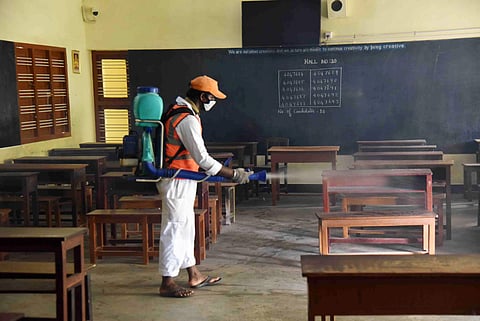

Scientists worldwide are accelerating their efforts at unimaginable speeds to develop a vaccine for Covid cure.
The global comity of people waits in hopeful anxiety for a cure to this killer virus and a speedy return to normalcy from this gruelling and cruel pandemic.
Every nation needs this ‘one size fits all’ equivalent vaccine as Covid-19 has affected all sections of global humanity without any discrimination.
While the anti-Covid vaccine shall be the world’s common prescription, education need not be in search of a common prescription either at global or national level.
Ever since the world began to see the longest lockdown since World War II, countries announced their own versions of lockdown to fight Covid.
One of the biggest casualties were schools and colleges, which were disconnected from their students and students immediately disconnected from learning.
Almost 1.5 billion students were out of schools globally and more than 80 percent of colleges and universities closed for teaching.
The danger of students dropping out of school and college education was looming large and this could mean that efforts so far of countries and various development agencies to expand access to education were at risk.
A quick realisation dawned with various interim solutions that ensured while institutions were closed, learning wasn’t. We managed to pull back students by pushing certain reforms. The world is at a crossroads now and every country is symptomatic with their own challenges of post-Covidian education reforms. India is no exception with the kind of complexities it is confronted with.
The Indian response to post-Covidian reforms has been nimble and agile. Policymakers, institutions and individuals have demonstrated an unprecedented sense of coherent synergy in getting their acts together to ensure that academic year 2019-20 comes to a successful close with minimum collateral damage.
Mindful of the fact that such quick-fix short-term solutions cannot be permanent policies, it is imperative to lay the contours of medium and long-term policies that can chisel the rough terrains of higher education to ensure a smooth journey as we step into the new order.
The quasi-learning environments through online and other exotic variants serve a limited purpose and cannot be paraded as an educational edifice providing the elixir of immortal knowledge which can be delivered only in regular forms of wholesome education in brick and mortar institutions. We need a calibrated mix of both.
However, caution must be exercised to tone down the screams of online and tune the strings of policy, people and process. The latter is the need of the hour to shape the contours of Indian higher education with a touch of self-reliance at all levels.
A multi-stakeholder effort is necessary to revisit the existing regulations and norms that govern higher education. Various statutory bodies like UGC, AICTE, MCI, NCTE, BCI, etc. must come together in an act of unprecedented policy unity along with experts from public and private institutions and industry. A National Task Force on Higher Education post-Covid Policy Reforms is necessary.
With the New Education Policy impregnated with such visionary structural reforms through its proposed Higher Education Commission of India and its four verticals, and the National Research Foundation, it is not a bad idea to ensure that all these six have adequate representation from all quarters for sound toning and policy tuning across the three Ps—Policy, People and Process.